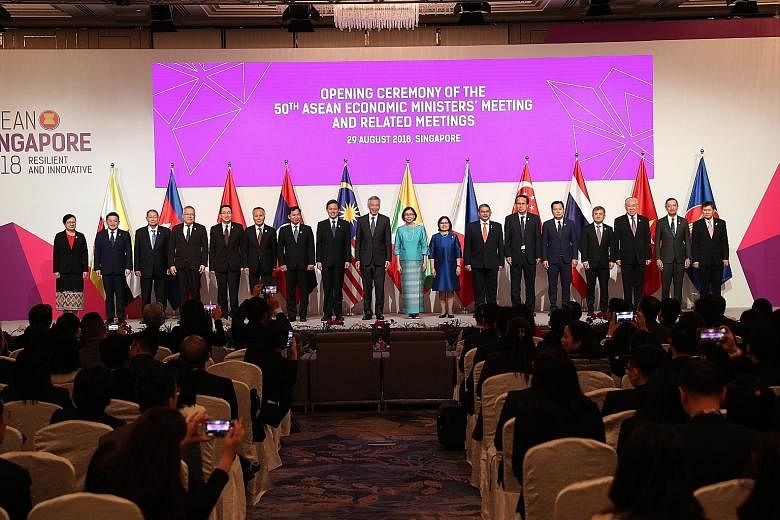Talks on a major trade pact between Asean and six Asia-Pacific countries have reached a critical stage and could be "substantively concluded" soon, Prime Minister Lee Hsien Loong said yesterday.
Asean member countries have been pushing for the trade deal, the Regional Comprehensive Economic Partnership (RCEP), to be inked by the end of this year.
It would create the world's largest trading bloc, covering one-third of the world's gross domestic product (GDP), or about US$17.23 trillion (S$23.5 trillion).
Aside from the 10 Asean members, the other nations are China, India, Australia, Japan, South Korea and New Zealand.
PM Lee, in his opening speech at the four-day 50th Asean Economic Ministers' Meeting at the Shangri-La Hotel, said Asean has "exerted significant effort" to make progress on the RCEP.
He said: "The RCEP negotiations have continued for some time and have now reached a critical stage.
"After a great deal of work, the possibility of substantively concluding the RCEP negotiations is finally in sight."
He added: "I encourage RCEP countries to take a long-term view, keep up the momentum, engage constructively and with maximum flexibility, so that we can deliver a high-quality RCEP agreement this year."
Given the diversity of RCEP's members, "we all have to make trade-offs and compromises", he said. "But we should weigh these against the significant strategic and economic value of the RCEP."
The impending signing of the trade pact comes amid growing trade tensions between the United States and its major trading partners such as Canada, the European Union and China.
The situation makes it all the more important that Asean strengthen its economic cooperation and integration, PM Lee said.
"The rules-based, multilateral trading system, which has underpinned Asean's growth and prosperity, is under pressure."
He added: "At the same time, each Asean member state is subject to different pulls and pressures from bigger powers. In these circumstances, all the more, members must stay united and strive to maintain our cohesion and effectiveness."
This includes pressing on with regional economic integration and fully implementing the Asean Economic Community Blueprint 2025, which will let Asean businesses operate more seamlessly across the region and make them, and Asean economies, more competitive globally, the Prime Minister said.
This would also help Asean realise its full potential, he added.
Asean is forecast to be the fourth-largest economy in the world by 2030, after the US, China and EU.
GDP growth has averaged 5.4 per cent in recent years, and is projected to grow around this rate for the next five years, he said.
He said the 5.4 per cent growth is well above the global average, forecast to be 3.6 per cent this year.
He added that it is projected to grow around this rate for the next five years.
Trade and Industry Minister Chan Chun Sing, in his address at the meeting which ends on Saturday, said that despite rising nationalistic tendencies and anti-trade sentiments elsewhere in the world, Asean has stayed the course in deepening regional economic integration.
Businesses and consumers in the region have benefited from the realisation of the Asean Economic Community (AEC) in 2015, he said.
Intra-regional trade in goods are now largely tariff-free, while non-tariff barriers have been reduced progressively. Also, pro-business investment rules have been implemented and regulations of services are less stringent and more transparent.
Now, Asean leaders are working on several initiatives to further drive regional cooperation in areas such as digital connectivity, Customs clearance and tourism, Mr Chan said.
For the future, he urged Asean to identify areas where individual economies can complement one another to compete beyond Asean, as well as further promote trade, investment and people-to-people links.
"We cannot afford to let recent policy U-turns elsewhere distract us from defending the very foundation that underpins the AEC and has benefited the region," he said.


